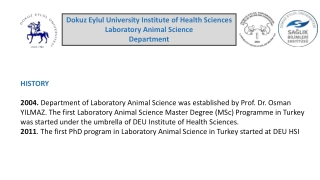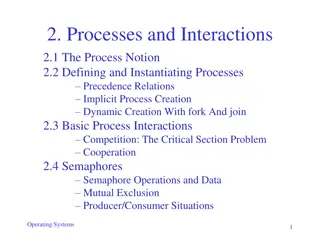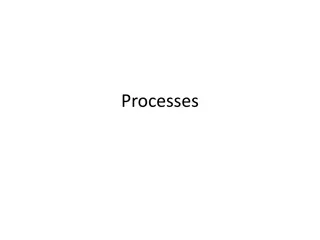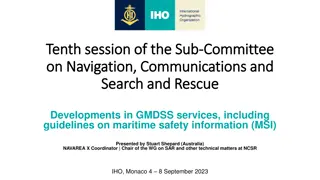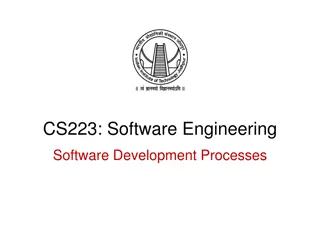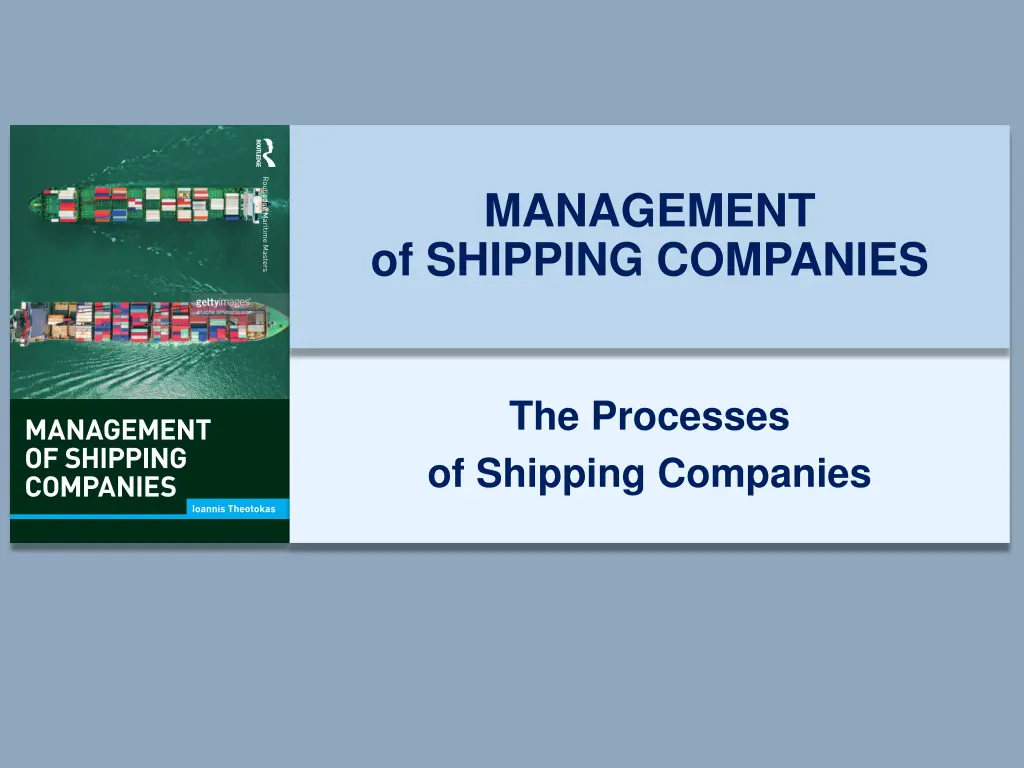
Shipping Company Management Processes
Explore the essential processes involved in managing shipping companies, including constituent parts, core activities, demand management, vessel operations, and financial management. Learn about ship selection, chartering, vessel management, and more. Dive into the strategic decisions, market assessments, fleet structuring, and ship financing crucial for successful shipping operations.
Download Presentation

Please find below an Image/Link to download the presentation.
The content on the website is provided AS IS for your information and personal use only. It may not be sold, licensed, or shared on other websites without obtaining consent from the author. If you encounter any issues during the download, it is possible that the publisher has removed the file from their server.
You are allowed to download the files provided on this website for personal or commercial use, subject to the condition that they are used lawfully. All files are the property of their respective owners.
The content on the website is provided AS IS for your information and personal use only. It may not be sold, licensed, or shared on other websites without obtaining consent from the author.
E N D
Presentation Transcript
MANAGEMENT of SHIPPING COMPANIES The Processes of Shipping Companies
Companys constituent parts Systems approach of the company Process related to the core of its activities Product development Demand management Order fulfilment Support systems Capital assets People Information Control systems Support? systems Product? development Customers? Suppliers? Demand? management Order?fulfilment Control? systems Based on Miller (1998: Figure 4.7). 2 The Processes of Shipping Companies I. Theotokas (2018) Management of Shipping Companies London: Routledge
Processes related to the core of shipping companies activities Processes in connection with the development of the transport service Processes in connection with the creation and management of demand (chartering) Processes in connection with the meeting of demand (operations of vessels) 3 The Processes of Shipping Companies I. Theotokas (2018) Management of Shipping Companies London: Routledge
The processes of shipping companies Selection and purchase of ships Employment for the vessels (chartering) Operational management of vessels Technical management of vessels Support for the operation of the vessel Staffing of vessels and offices Insurance cover against risks Management of information and communications Financial management (Finance and accounting) Communication with charterers and other social and business partners Safety, quality, and training 4 The Processes of Shipping Companies I. Theotokas (2018) Management of Shipping Companies London: Routledge
Selection and purchase of ships (I) Decision for the strategic direction of the company Selection of the sectors/charter markets Assessment of trends in the charter markets Decisions about The structure of the fleet The charter markets in which it will be active The types of ships and its specific characteristics The efficient use of resources The choice between acquisition of second hand ship or the building of a new ship The finance of investment The timing of investment The classification society, the register, the insurance cover of ship/ships 5 The Processes of Shipping Companies I. Theotokas (2018) Management of Shipping Companies London: Routledge
Ship types and transportation services (I) In the case of liner shipping, the development of the service is more complicated Decisions (Mulder and Dekker 2018) Strategic planning level Fleet size Trade lines to participate Tactical level Network design Pricing Repositioning of empty containers Operational planning level Cargo routing for optimal ship allocation and numbers of unloading and transhipment operation, penalties avoidance for demand not met and minimisation of transit time constraints Disruption management with minimum cost Revenue management by varying prices according to available capacity between port pairs Stowage planning of containers during the loading of the ship, taking into account the constraints Both strategic and operational Saling speed and bunkering optimisation Robust schedule design 6 The Processes of Shipping Companies I. Theotokas (2018) Management of Shipping Companies London: Routledge
Ship types and transportation services (II) Development of service: Bulk shipping: has to do chiefly with the vessel which will supply it, Liner shipping company: has to do with a series of factors which may lie outside its limits. Liner shipping companies, in their effort to control as many of these factors, as possible, have expanded their activities in order to provide the integrated service the customers require. Differentiate their services, to increase their source of income, and to tie their customers to the upstream and downstream logistics services, thus increasing customers switching cost, and expand vertically and horizontally 7 The Processes of Shipping Companies I. Theotokas (2018) Management of Shipping Companies London: Routledge
Service characteristics in bulk and liner shipping Container? vessels? operate?in? fixed? trade? pattern? irrespective?of? the? short? term? variations? in? demand? Bulk? trades? are?served? by? relatively?simple? standardized? vessels Service?offered?by? alternative?shipping? firms? cannot? be? differentiated Differentiation?of? service? to? increase? revenue Operators?have? to? provide? for? the? marginal? demand? - cannot? let? vessels? move? between? the? market? segments? to? exploit? opportunities Do? not? require? a? big? organization? ashore? for? technical? or? commercial? management Service?characteristics?in? liner? shipping Service?characteristics?of? bulk? shipping Liners? are?part? of? a? supply? system Limited? number? of? customers Service?requirements?dominate? ? - movements? towards? just-in-time? -focus? on? product? flows? in? logistics A? fringe? of? small? operators? with? a? few? vessels? each? - compete? with? big? operators Economies? of? scale? at? the? firm? level? are? very? limited The? transport?costs? are? administratively? set? and? fixed? in? the? short? run Barriers?to? entry?because? of? economies? of? scale? in? vessel? size? and? firm? size Use? of? ship-broking? firms Industry? characterized? by? nearly? perfect? competition Minimum? number? of? ships? to? operate? a? fixed? schedule? with? minimum? frequency High? concentration? in? the? market Important? economies? of? scale? in? bulk? vessels Organization? that? can? handle? requirements? of? large? number? in? transactions? with? cargo? owners Technical? management? may? be? outsourced? to? independent? ship? management? firms Source: I.Theotokas (2018) Management of Shipping Companies. London: Routledge Figure 3.3. 8 The Processes of Shipping Companies I. Theotokas (2018) Management of Shipping Companies London: Routledge
Maritime transportation services in liner shipping 9 The Processes of Shipping Companies I. Theotokas (2018) Management of Shipping Companies London: Routledge
Employment of the vessels (Chartering) Bulk shipping companies Chartering: Recurring decision with features of unplanned decision Choice between different types of chartering or employment of vessels Voyage/Spot charter Time charter Bare boat charter Contract of Affreightment Participation in Pools Critical factors that affect decision making Absence of sufficient information Bounded rationality Risk and profile of decision maker 10 The Processes of Shipping Companies I. Theotokas (2018) Management of Shipping Companies London: Routledge
Shipbrokers Study of the market and the gathering of information in connection with the level of supply and demand for ships, and the level of freights; Search for cargoes to be transported, for the submission of a proposal on undertaking the job, either by voyage charter or by time charter; Receipt of offers and the analysis of likely results for the company; Calculation of the revenues and expenses for the ship's voyage in the case of the proposed charter; Analysis and negotiation of the terms and the final drafting of the charter party; Provision of the necessary instructions to the captain and the managers of the vessel in connection with the charter; Monitoring of the proper implementation of the charter party until the charter is completed; Maintaining of good relations with the shippers and the promotion of the company's image. 11 The Processes of Shipping Companies I. Theotokas (2018) Management of Shipping Companies London: Routledge
Charter party sets out a series of material terms, the most important of which are: a description of the shipment; the date of loading and the date of cancellation of the charter; the port of loading and the port of discharging; the level of the freight and the payment; the lay days or lay time, that is, the days agreed for the loading and discharging of the vessel; the demurrage - the sum payable by the shipper to the shipowner in the event of the vessel needing more than the agreed time for its loading or discharge; the indemnity - the sum payable by the shipowner in the event of the loading or discharge taking place earlier than at the time agreed; the brokerage to be paid; the rights of lien - the right of the shipowner to retain the shipment until the freight is paid; the exceptions from responsibility - the cases in which the owner is relieved of liability; the averages - the losses or extra-ordinary expenses for the salvaging of the vessel and the cargo; arbitration - the determination of the manner in which possible disputes between shipper and owner will be resolved; the penalty clause to be imposed in the event of a breach of the contract; the expenses for loading and discharge and who will pay them. 12 The Processes of Shipping Companies I. Theotokas (2018) Management of Shipping Companies London: Routledge
Employment for the vessels Liner shipping companies The process of finding employment is more complicated. (Frankel, 1982). It is usually organised by a department responsible for marketing and sales, in which a large part of their personnel is employed Companies are systematically concerned with the process of creating, communicating, delivery, and exchange of outflows Head office: responsibility for market research, the development of new services and their advancement and promotion, research into customer satisfaction, the co-ordination of the company's sales network, relations with the company's major shippers, Representative offices/agents: Transportation contracts 13 The Processes of Shipping Companies I. Theotokas (2018) Management of Shipping Companies London: Routledge
Employment for the vessels Bulk vs Liner High Bulk Negotiations Industrial? shipping Liner Low No.? of? transactions Low High Stopford, . (2000) 'E-commerce mplications, pportunities and Threats for the Shipping Business', Grout Lecture 2000, Institute of Transport and Logistics, 11th April. 14 The Processes of Shipping Companies I. Theotokas (2018) Management of Shipping Companies London: Routledge
Operational management of vessels Core activity of shipping companies Cost effective management of ships and competitive advantage Operations department: responsible for the co-ordination & implementation of activities relating to the operation of the ship Ship operators: undertake the operational management of the vessel Group of processes related to the operational management department External processes: the relations with the ship's agents, the suppliers of fuels, the charterers, and the rest of those involved On the ships, whose movements it follows closely and supports Internal processes: the relations which it maintains with other departments of the company and the information which it supplies to and receives from these 15 The Processes of Shipping Companies I. Theotokas (2018) Management of Shipping Companies London: Routledge
Operator of ship(s) Voyage schedule Appointment of Agents Arrangement of details of loading and discharge Bunkering Provision of voyage instructions to the captain Cost control Insurance claims Freight collection Ships disbursements Coordination of others departments activities related to the ship s operation Ships position list 16 The Processes of Shipping Companies I. Theotokas (2018) Management of Shipping Companies London: Routledge
Technical management of ships Core activity of shipping companies Cost effective management of ships and competitive advantage The maintenance of a seaworthy condition and the minimisation ofthe time in which the vessels remains out of operation (off-hire) are preconditions for its effective management Responsibility for technical management, lies with the technical department Superintendent engineer: the member of the team responsible for the technical management of the vessel 17 The Processes of Shipping Companies I. Theotokas (2018) Management of Shipping Companies London: Routledge
Technical department (I) Maintenance and management of the vessels and their equipment Designing work plans and budgets, and ensuring the anticipated results are achieved Ensuring that the vessel has all the necessary certifications to sail Preparing the vessel s attendance reports, which provide information on its performance and safety but also its adherence to regulations, in which damage reports are also included Receiving offers from ship repair yards for scheduled maintenance work and necessary repairs, compiling budgets, co-ordinates technical support for the work being done on the vessel Supply of suitable parts, equipment, and services for the vessel Visiting and inspecting the vessels, and check their operations and the degree to which the crew responds to its duties and obligations. Checking the technical performance of the vessel and planning corrections if divergences are recorded 18 The Processes of Shipping Companies I. Theotokas (2018) Management of Shipping Companies London: Routledge
Technical department (II) Collecting and distributing documents and technical information on the vessel Keeping an archive of documents to be processed but also for legal purposes, which includes data on the characteristics and performance of the vessel, a diary of maintenance and repairs, inspections and checks, machinery and equipment, etc Supply of advisory services and dealing with emergency incidents among the engine-room staff, as well as guidelines for maintenance work Co-ordination with the vessel s operator and the rest of the management for the safe, effective, and economical operation of the vessel and making sure it is in a seaworthy condition Supervising the vessel s technical staff Ensuring that the vessels responds from a technical point of view to the requirements of the management system for safety, quality, and environmental responsibility 19 The Processes of Shipping Companies I. Theotokas (2018) Management of Shipping Companies London: Routledge
Support for the operation of vessels Responsibility for supporting the operation of the vessel through the provision of equipment and supplies lies with the companies supply department, which: Ensures that the vessel is sufficiently provided with equipment and supplies so that there is no impact on the execution of the voyage and that no danger arises due to a lack of supplies, either to the crew of the vessel or to its cargo. In many companies the supply department, in collaboration with the crew department, ensures the transportation of the crews to and from the vessels. Seeks the purchase of supplies for the vessel at an advantageous cost, with the expected quality and at an appropriate time and make sure that equipment and supplies reach the vessel at the moment that they are needed, as supplies are not stored on the vessel beyond an economically acceptable level Monitors and controls each of the company s procurements, from the moment that the need arises to the purchase and delivery of the item to the vessel. Collaborates with other departments in the company, particularly the operations and technical management departments. 20 The Processes of Shipping Companies I. Theotokas (2018) Management of Shipping Companies London: Routledge
Staffing of vessels and offices All the practices of the Human Resources Management which safeguard the company's performance HR planning and recruitment analysis and design of work selection and placement of candidates training and development of HR performance management remuneration labour relations All the practices are applied to the management of the personnel on land and on board the vessel, with minor variations or adaptations either by a unified administration or by separate departments of the company Manning of the vessel in particular and the relevant HR practices is the responsibility of the crewing department 21 The Processes of Shipping Companies I. Theotokas (2018) Management of Shipping Companies London: Routledge
Insurance cover against risks Shipping companies seek insurance cover for protection against financial risks arising from unexpected and uncontrollable situations The handling of the shipping company's insurance cover is undertaken by the special insurance department, which is responsible for Ensuring the protection of the shipowner (an individual or a business) from financial risks by means of the insuring of the vessel for total or partial loss Hull and Machinery War risks Protection & Indemnity Pirates loss of hire and kidnap Monitoring and processing of claims which may arise for the company, Collaboration with the competent departments and the captains of the vessels and provision of necessary information to them 22 The Processes of Shipping Companies I. Theotokas (2018) Management of Shipping Companies London: Routledge
Management of information and communications The responsibility for the development and operation of these systems is that of the Information Technology department, among whose basic duties are the co-ordination and operation of its equipment and operating system in view of the requirements set by its safety, quality, and environmental responsibility systems responsibility for effective communication between its vessels and offices the development of software or the selection of ready- made solutions which will respond to its needs; monitoring of the keeping of the records of the operating system provision of assistance to its personnel the solving of technical problems 23 The Processes of Shipping Companies I. Theotokas (2018) Management of Shipping Companies London: Routledge
Finance and accounting The aim of financial management is the handling of the company's finances and the maximisation of its total value Spatial dispersion and the need for monitoring accounting of the ships' The finance department of a shipping company is responsible for the drawing up of the budget monitoring of expenditure at every level of the company management of the insurances and insurance claims account, and of financial issues involving crews monitoring of the operation of the company and of the vessels in accounting terms management of the company's cash resources and the carrying out of audits monitoring of the monthly general accounts of the Masters' General Accounts management of relations with banks, or, of relations with the supervisory authorities and the shareholders Long term investment plans, forecasting of income for each activity, assessment of needs for investments and for relevant sources 24 The Processes of Shipping Companies I. Theotokas (2018) Management of Shipping Companies London: Routledge
Communication with charterers and other social and business partners Shipping companies should concern themselves with their image and the way in which this becomes known to the shareholders, the customers / charterers, and to their other social and business partners (suppliers, employees, local community, government, occupational unions, etc.). communications department: the department responsible for the management of the company's relations with the mass media, and, more generally, with those groups involved in its operation companies incorporate their communications departments into the planning for dealing with emergencies (crisis management), assigning to them the special responsibility for planning, co-ordinating, and implementing the actions for communication with the mass media and with any other group of individuals involved in the situation For publicly listed companies the process of communication extends to their relations with shareholders 25 The Processes of Shipping Companies I. Theotokas (2018) Management of Shipping Companies London: Routledge
Safety, quality, and training (I) The process of the system of management of safety, quality, and training is carried out by a special department, whereas in certain others, mainly of a large size, an independent department for the organisation and carrying out of the training of the human resources is in operation In companies of a large size, an independent department for the organisation and carrying out of the training of the human resources is in operation The tasks of the safety, quality, and training department are: the planning, application, monitoring of the implementation, and the assessment of the safety, quality, and environmental responsibility management systems the monitoring of the regulatory framework of operation of shipping companies in relation to safety and the protection of the environment, and the necessary updating of the systems the carrying out of checks and inspections on the ships in order to ensure their compliance with what is stipulated in the systems 26 The Processes of Shipping Companies I. Theotokas (2018) Management of Shipping Companies London: Routledge
Safety, quality, and training (II) The tasks of the safety, quality, and training department are (cont): the constant upgrading of the systems by means of the improvement of the rules and processes which these include the recording, analysis, and assessment of data relating to accidents and other incidents of non-compliance, and the planning of corrective actions the training and familiarisation of the personnel with the company's system by means of the planning and carrying out of training programmes the planning and carrying out, in collaboration with the captains, of exercises and drills, in order for them to deal with emergency situations the ensuring of adequate understanding on the part of the persons involved of the framework within which the systems operate the co-ordination and checking of the carrying out of the activities of other departments of the company connected with the system s implementation the co-ordination of actions to deal with emergencies (accidents, etc.) by the authorised staff 27 The Processes of Shipping Companies I. Theotokas (2018) Management of Shipping Companies London: Routledge
Shipping companies processes and systems Shipping Company Support Systems Human Resources Ships/offices Financial Management Information/ Communication Charterers/Shippers Selection-purchase of ships Suppliers Demand management for the ships services Public relations/Communication Operation of ships, Technical Management, Support of ships, Insurance, Safety-Quality-Training Control systems Source: I.Theotokas (2018) Management of Shipping Companies. London: Routledge Figure 3.2. 28 The Processes of Shipping Companies I. Theotokas (2018) Management of Shipping Companies London: Routledge

